Praise for Organic Mushroom Farming and Mycoremediation
This is a reference book for the next generation of DIY mycologists. It is a great practical guide to mushroom cultivation, starting with basic concepts and building from there to mycoremediation and experimental strain development. Tradd Cotter is a man with a mission, who has done and thought about all this a lot; he has learned to explain it with great clarity and in a simple and well-organized manner.
SANDOR ELLIX KATZ , fermentation revivalist and author of The Art of Fermentation and Wild Fermentation
Tradd Cotter has written a clear, comprehensive guide that is a gift to amateur as well as professional mushroom growers. The pages are enlivened by Cotters enthusiasm for the many possibilities that fungi offer, and his obvious familiarity with growing these marvelous creaturesnot just theoretical knowledgemakes the book particularly valuable. This book opens the doors wide to a diverse and fascinating fungal world.
TOBY HEMENWAY , author of Gaias Garden: A Guide to Home-Scale Permaculture
Finally, an accessible resource covering a wide variety of mushroom-cultivation approaches. Tradd Cotters book fills an enormous needIve been wishing for a resource like this for a long time. This is the kind of book Ill keep nearby and will turn to often over the years. Any farmer or gardener who wishes to garner food or medicine value from wood needs to understand and cultivate mushrooms. And this is the best all-around manual Ive seen.
BEN FALK , author of The Resilient Farm and Homestead
Wow! Tradd Cotter is a genius of organic mushroom production. His step-by-step instructions and beautiful photography make this a must-have book.
ROBERT ROGERS , author of The Fungal Pharmacy: The Complete Guide to Medicinal Mushrooms and Lichens of North America
Mushroom cultivation should be playing a much bigger role in our gardens and farms. Tradd Cotters Organic Mushroom Farming and Mycoremediation provides low-cost, easily accessible techniques for growing mushrooms indoors and outdoors, from home to commercial scale.
ERIC TOENSMEIER , author of Paradise Lot and Perennial Vegetables
Tradd Cotter has done a wonderful job sharing his practical experience in a well-organized way with illustrations that clearly underline the topics. Organic Mushroom Farming and Mycoremediation is an invaluable resource for teaching students about mushroom cultivation.
PETER OEI , author of Mushroom Cultivation and director of horticulture innovation at InnovatieNetwerk, Dutch Ministry of Economic Affairs, and founder of MeattheMushroom.nl and spore.nl
Organic Mushroom Farming and Mycoremediation is a guide and inspiration for new and experienced mushroom cultivators alike. Tradd Cotter has done a great job of combining the complexity of mushroom cultivation with the intuitive simplicity of small steps. Highly recommended for fungophiles as a great read and reference!
JIM GIBSON , past president, Colorado Mycological Society
Organic Mushroom Farming and Mycoremediation
SIMPLE TO ADVANCED AND EXPERIMENTAL TECHNIQUES FOR INDOOR AND OUTDOOR CULTIVATION
 TRADD COTTER
TRADD COTTER
Chelsea Green Publishing
White River Junction, Vermont
Copyright 2014 by Tradd Cotter.
All rights reserved.
Unless otherwise noted, all photographs and illustrations copyright
2014 by Tradd and Olga Cotter.
No part of this book may be transmitted or reproduced in any form by any means without permission in writing from the publisher.
Developmental Editor: Brianne Goodspeed
Project Manager: Patricia Stone
Copy Editor: Nancy Ringer
Proofreader: Laura Jorstad
Indexer: Shana Milkie
Designer: Melissa Jacobson
Printed in the United States of America.
First printing August, 2014.
10 9 8 7 6 5 4 3 2 1 14 15 16 17 18
Our Commitment to Green Publishing
Chelsea Green sees publishing as a tool for cultural change and ecological stewardship. We strive to align our book manufacturing practices with our editorial mission and to reduce the impact of our business enterprise in the environment. We print our books and catalogs on chlorine-free recycled paper, using vegetable-based inks whenever possible. This book may cost slightly more because it was printed on paper that contains recycled fiber, and we hope youll agree that its worth it. Chelsea Green is a member of the Green Press Initiative (www.greenpressinitiative.org), a nonprofit coalition of publishers, manufacturers, and authors working to protect the worlds endangered forests and conserve natural resources. Organic Mushroom Farming and Mycoremediation was printed on paper supplied by RR Donnelly that contains at least 10% postconsumer recycled fiber.
Library of Congress Cataloging-in-Publication Data
Cotter, Tradd, 1973
Organic mushroom farming and mycoremediation : simple to advanced and experimental techniques for indoor and outdoor cultivation / Tradd Cotter.
pages cm
Includes bibliographical references and index.
ISBN 978-1-60358-455-5 (pbk.) ISBN 978-1-60358-456-2 (ebook)
1. Mushroom culture. 2. MushroomsOrganic farming. 3. Fungal remediation. I. Title.
SB353.C83 2014
635.8dc23
2014015959
Chelsea Green Publishing
85 North Main Street, Suite 120
White River Junction, VT 05001
(802) 295-6300
www.chelseagreen.com |
Contents
PART I
The Fundamentals of Mushroom Cultivation
PART II
Mushrooms for Life: Innovative Applications and Projects Using Fungi
PART III
Advanced Techniques and Research
PART IV
Meet the Cultivated Mushrooms
For a more complete list of common names, see individual profiles for each genus
Introduction
When someone asks me if I grow magic mushrooms, I always reply by asking, Arent all mushrooms magical? I have been growing, culturing, researching, hunting, and learning everything I can about mushrooms for the last twenty years. I work with all kinds of mushrooms, and I am fascinated by every single one. The more you learn, the more your belief in their magic will grow.
My journey with mushrooms did not start out auspiciously. Although I loved the outdoors as a kid, I was far more interested in walking down through the woods to my grandparents lake in North Carolina to go fishing than in paying attention to the mushrooms growing around me. By twenty, I was living with my parentstrying to balance college classes and singing in a bandand one day my mother suggested that I stop by a nearby mushroom farm for a tour. She knew I was interested in biology, it seemed like something different and cool to do, and maybe it was her subliminal way of telling me to get out and find a job.
I knew nothing about mushrooms. Zero. Not even basic varieties at the supermarket, which in 1994 were white buttons and, newly, portabellas. But I called the farm anyway. I remember it sounding very noisy and active and the owner sounded out of breath. Sure, he said, come on by later this afternoon and I can show you around quickly if you want to see how mushrooms grow. When I arrived, the building seemed very plain, with cinder-block walls and a metal roof, and not very exciting. I wasnt at all impressed with the looks of things.
The owner greeted me and quickly led me around, showing me the entire place, from the sterilizer unit cooking the growing media to colonization rooms and, finally, the place where the magic hit: the fruiting room. I will never forget the moment when I walked into that strange, foggy space, like something out of a dream, and down aisle after aisle of fruiting shiitake mushrooms growing on sawdust blocks. This was intriguing, and overwhelming, and I had so many questions running through my mind. My mouth opened all on its own and started peppering the owner with questions, so many that in retrospect I realize that my incredible inquisitiveness must have been annoying. But I was in shock. Amazed.



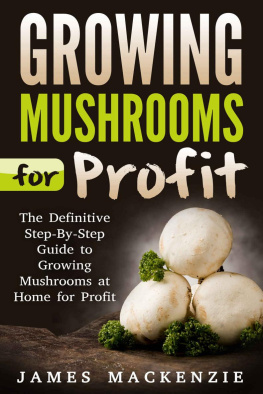
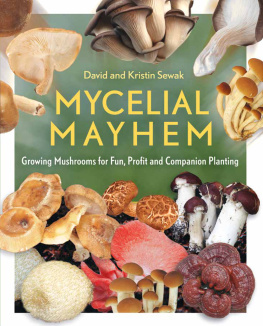
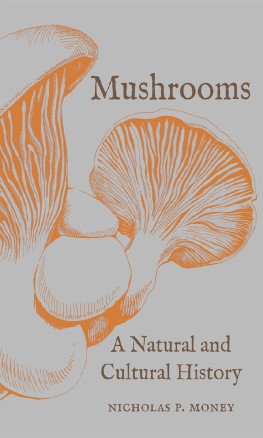
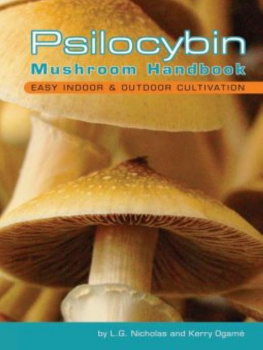
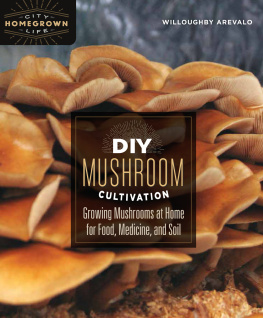
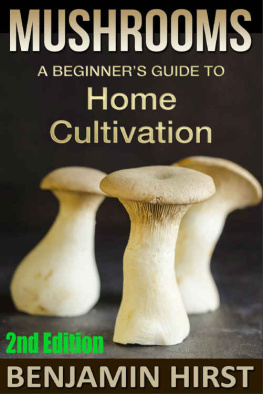
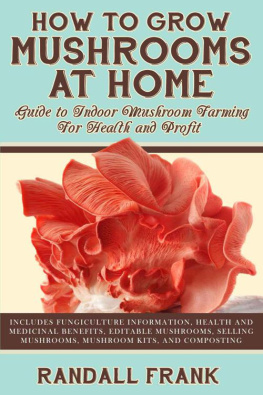
 TRADD COTTER
TRADD COTTER